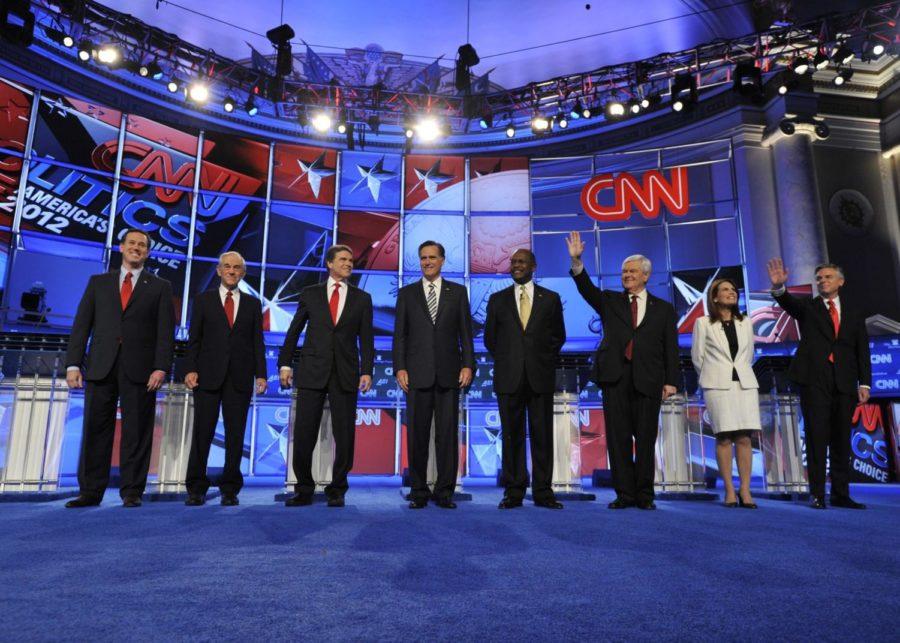Glawe: Fixing GOP requires openness
Photo courtesy of Edward M. Pio Roda
The Republican candidates at the CNN Republican National Security Debate held at Constitution Hall. Left to right: Former Pennsylvania Sen. Rick Santorum, Texas Rep. Ron Paul, Texas Gov. Rick Perry, former Gov. of Massachusetts Mitt Romney, former CEO of Godfather’s Pizza Herman Cain, former Speaker of the House Newt Gingrich, Minnesota Rep. Michele Bachmann and former Gov. of Utah Jon Huntsman.
April 4, 2013
The modern Republican Party is commonly, and rather mistakenly, touted by many of its members as the “Party of Lincoln.” While this used to be true, the Republicans are now merely a withered shadow of their former prestige. The party that once saved the Union is now the one damaging it.
“Lincoln’s Party” has been seized and fabricated by “Reagan’s Party.”
If the Republican Party actually was the party of Lincoln, and acted that way, I would probably be one of them. But they’re not, so I’m not.
Yet I can’t help but notice the dramatic shift in the political spectrum during the course of my lifetime and well before I was born. Republicans have been shifting more and more to the right, making current Democrats look like the old Republicans (I think most Democrats would agree that many of President Barack Obama’s policies are not truly liberal-progressive policies). Fringe groups like the Tea Party now dominate the recesses of the Grand Old Party.
I do see a glimmer of hope for the Republican party, though. The question that must be asked is, “How do the Republicans ‘fix’ their party?”
Just two days after the Conservative Political Action Conference (March 14-16), Reince Priebus released his “autopsy report” of the GOP (I find the categorization of this report as an “autopsy” most fitting). The report, however, does not outline specific policy changes to the Republican platform (with the exception, possibly, of immigration reform). Rather, the report talks about “communication” with young and minority voters.
This essentially ignores the real issues young and minority voters are actually concerned about (voter suppression, costs of education, etc.). Instead, Priebus suggests that retooling “how” Republicans deliver their message is the real cure. The report adds new “marketing techniques,” data enhancement and even new fundraising avenues.
The GOP needs to realize that it’s not “how” they deliver the message; it’s the message itself. I have spent months, since perhaps the elections, trying to figure out how to fix this “message” problem. After all, the nation deserves to have two viable parties that can forge compromise when it is needed most.
I have too many suggestions for policy changes (changes that will stay in line with what republicans believe in, might I add), so I will save those for a comprehensive follow-up column. Instead, for the sake of column space, let’s focus on “attitude.”
(To be fair, there are plenty of changes I’d like see in the Democratic platform as well.)
The Republican Party can cure its state of myopia by dampening the tone and form of their rhetoric (I know this is a salient point put forth by Priebus, but it’s a start). The attitude for the last four years has been “The Democrats are to blame and you’re all stupid for voting for them …” Neither party should be using this kind of language. A losing party should first look themselves in the mirror. Reflection is always the best way to begin anew.
The GOP must open up discussions with the people who don’t agree with them. Their platform can no longer stand on “our way or the highway” principles. As Priebus’ report stated, Republicans are good at appealing to people who agree with them (Really? Was that even necessary to put in the report?). Making attempts to bridge the political divide will foster genuine discussion on heated policy issues.
I often imagine how engaging (and tolerable) debates would be if Democrats acted like Noam Chomsky and Republicans like William Buckley (except with a little less arrogance). That level of intellectually honest conversation would force politicians to be on top of their game every day. Instead, we have very misguided claims about climatology, macroeconomic stimuli or whatever, that are easily refutable by evidence.
Lastly, as a sort of prelude to my next column, the GOP needs to clearly separate the subjective from the objective. The reason voters don’t trust political parties is because they tend to use think tanks to weld together pseudo-evidence that is “in line” with their own ideology. Opinions should be formed from the throes of independent research. Evidence should always be gathered with an open-mind.
Lincoln’s Republican Party combated slavery and saved the Union. Our sixteenth president and his party did this by keeping an open mind with those who disagreed with them (the abolitionists, Whigs, Conservatives, and Conservative Democrats). Not to mention the fact that Lincoln’s cabinet was composed entirely of his political rivals (Seward, Bates, Chase and Stanton).
If Republicans could accomplish this delicate balancing act in the midst of the Civil War, they can definitely accomplish it now.
Republicans should, ideally, stand for what Lincoln stood for, not for what Reagan stood for, but they don’t. As is observed in the show “The Newsroom,” the first step in solving a problem is realizing there is one.
The GOP requires fixing.
Michael Glawe is a junior in mathematics and economics from New Ulm, Minn.

















